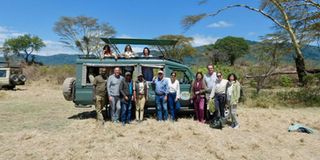Eco-friendly club wins Tanzania tour accolade

European Travel Writers in a photo with the electric car at Ngorongoro crater
What you need to know:
- Since debuting East Africa’s first 100 percent electric safari vehicle in 2018, MKSC has emerged as a trailblaser in sustainable tourism.
- The company further enhances its green credentials with the operation of 10 solar-powered lodges and camps across the region.
Arusha. The Mount Kilimanjaro Safari Club (MKSC) has garnered international acclaim for its pioneering green investments in Tanzania’s northern tourism circuit, setting a new standard in eco-friendly travel.
Since debuting East Africa’s first 100 percent electric safari vehicle in 2018, MKSC has emerged as a trailblaser in sustainable tourism. The company further enhances its green credentials with the operation of 10 solar-powered lodges and camps across the region.
Prominent travel writer Ms Carolina Saporiti from Vanity Fair Magazine recently praised the electric safari vehicles during her visit to Arusha.
She highlighted the unique advantage of silent electric vehicles in wildlife safaris. “The special touch was doing a safari with electric cars, because the way you can approach the animals is unique,” she noted.
Ms Saporiti observed that the quiet operation of electric vehicles seemed to disturb wildlife less compared to traditional safari jeeps, which often alarm animals with their noise.
French journalist Ms Marjorie Cessac echoed similar sentiments. After revisiting the Serengeti for the first time in 15 years, she noted the increase in tourists and safari vehicles.
“To face the upsurge of tourists and to preserve nature, Tanzania really needs to develop electric cars to avoid air and noise pollution,” she said.
Ms Cessac also expressed hope that electric vehicle technology would extend beyond safari tours, benefiting daily transportation in both urban and rural areas. Spanish travel journalist Ms Ana Montañez from La Opinión de Málaga emphasized the long-term potential of electric safari vehicles for Tanzania’s future.
She envisioned these vehicles creating new job opportunities and enhancing environmental protection by reducing noise and pollution. Ms Montañez praised MKSC for its innovative approach to wildlife interaction, emphasising respect and minimal disruption.
MKSC’s managing director, Mr Dennis Lebouteux, shared insights into the operational success of their electric vehicles. Despite challenges posed by the Covid-19 pandemic, MKSC’s fleet of nine electric safari cars covered approximately 12,000 kilometers per month with minimal maintenance costs.
“Running an e-car can save an average of $8,000 to $10,000 on fuel alone per year,” Lebouteux noted. He emphasised that electric vehicles, powered entirely by solar energy, offer both environmental and economic benefits.
The broader implications of MKSC’s green initiatives reflect a growing global trend towards sustainable tourism.
A 2019 study by the United Nations Environment Programme (UNEP) highlighted that Costa Rica’s eco-friendly practices attracted 3.14 million tourists and generated $3.4 billion, significantly more than Tanzania’s 1.5 million tourists.
This underscores the increasing demand for green tourism destinations with low carbon footprints.
In Tanzania, the E-Motion project, a collaboration between Hanspaul Group and Gadgetronix, is advancing the use of electric vehicles. This initiative aims to transform traditional petrol and diesel vehicles into electric ones, positioning Tanzania as the second nation in Sub-Saharan Africa, following South Africa, to adopt electric safari vehicles.
The General Manager of E-Motion Neelkanth Govindji, explained that their retrofit technology replaces combustion engines and fuel systems with electric motors and batteries. “MKSC’s green investments are in line with the global movement towards sustainability in tourism,” said the company’s Director, Mr George Meing’erai.
As eco-conscious travel gains popularity, Tanzania’s innovative efforts in electric safari vehicles are setting a new benchmark, appealing to tourists who prioritize environmental responsibility and seek unique, respectful wildlife experiences.




